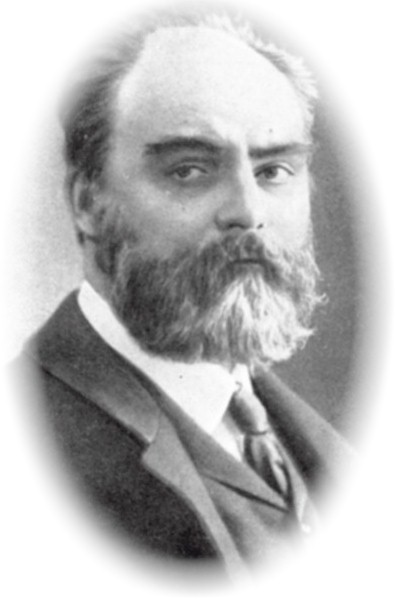Life
Sergei Mikhailovich Liapunov was born on 30 November 1859 in Yaroslavl, Russia, a town about 250 km northeast of Moscow. His father, Mikhail Vasilievich Liapunov (1820-1868) was a mathematician and astronomer who became the director of the Demidovsky Institute in Yaroslavl, while his mother, Sofya Alexandrovna (née Shipilov), an accomplished amateur pianist, did much to foster Sergei's interest in music. Sergei had two brothers, Alexander (1857-1918; photo), who became a famous and influential mathematician, and Boris (1862-1943), a philologist who was a member of the Academy of Sciences of the U.S.S.R.
After Mikhail's early death, the family moved to Nizhny-Novgorod, where Sergei was enrolled in a class of the Russian Musical Society. When his mother died in the late 1870s, the Liapunov sons were assisted by the Shipilov family, but for which the three brothers would have suffered severe financial disadvantages.
Nikolai Rubinstein (1835-1881) advised Sergei to move to Moscow to enter the Conservatory there, which he did in 1878, studying piano with Karl Klindworth (1830-1916), Paul Pabst (1834-1897), and V.I. Wilborg (who graduated from Klindworth's class in 1872 and taught at the Moscow Conservatory as a "younger/lesser teacher" between 1877 and 1881, according to the Moscow Conservatory Encyclopedia (2007; p. 86)), and composition with Nikolai Hubert (1840-1888), Pyotr Ilyich Tchaikovsky (1840-1893), and Sergei Taneyev (1856-1915). While in Nizhny-Novgorod, Liapunov had already been attracted to the music of Mily Balakirev (1837-1910) and his cohorts Alexander Borodin (1833-1887), Modeste Mussorgsky (1839-1881), and Nikolai Rimsky-Korsakov (1844-1908). Now that he was in Moscow, where they were not well known, his leanings toward their style became evident in spite of his exposure to the more western-oriented works of Tchaikovsky and Sergei Taneyev prevalent at the Conservatory.
Liapunov turned down an offer to teach at the Moscow Conservatory in favor of moving to St. Petersburg to pursue his work and put himself under the influence of Mily Balakirev, which he did in 1884. It is a more or less received opinion that Balakirev completely controlled Liapunov's musical development, as he had done at first with the other members of the Moguchaya Kuchka ("The Mighty Handful"). (Rimsky-Korsakov, in his memoirs, describes Liapunov as being completely under Balakirev's sway.) I, however, do not totally agree with that assessment, as it is clear that Liapunov early on developed a melodic style entirely his own, and though he owes much to Balakirev's (sometimes despotic) influence, he was never completely overwhelmed by his teacher and mentor.
A major influence in Liapunov's work was his collaboration in 1893 with Balakirev and Anatol Liadov (1855-1914) in the collection of folksongs from northern Russia, particularly the provinces of Kostromsk, Vologodsk, and Vyatsk. Many of these folksongs found their way into his Russian folksong arrangements of Opp. 10 and 13, the Solemn Overture on Russian Themes, Op. 7 of 1896, as well as into other works throughout his career. Perhaps the most famous of the pieces that demonstrate this influence is the 10th of the Twelve Transcendental Etudes, Op. 11, Lezhginka, which must surely rank as Liapunov's "hit tune."
In 1894 Liapunov became assistant director of the imperial chapel, succeeding Rimsky-Korsakov. In 1902 he resigned and became inspector at the Elena Institute (1902-1910). He was also a director of the Free School of Music from 1905, and headed that school between 1908 and 1911. Between 1910 and 1917 he taught piano and music theory at the St. Petersburg Conservatory, and in 1919 became a lecturer at the State Institute of Art. Liapunov's later career was marked by success as a concert pianist and conductor, making several tours of Europe in both capacities. He produced an impressive catalog of piano, vocal, and orchestral works until his death on 8 November 1924, in Paris, where he had emigrated in 1923 because of his dislike of the Soviet regime, and where he ran a music school for Russian émigrés. He is buried there near the Porte de Clichy in the Cimitière des Batignolles.
In addition to composing and performing, Liapunov worked with Balakirev to produce a complete edition of Mikhail Glinka's (1804-1857) works, prepared Alexander Dargomizhsky's (1813-1869) Rusalka for publication, edited the Balakirev-Tchaikovsky and Balakirev-Rimsky-Korsakov correspondence, wrote articles on Balakirev, and completed the finale of Balakirev's 2nd Piano Concerto.
